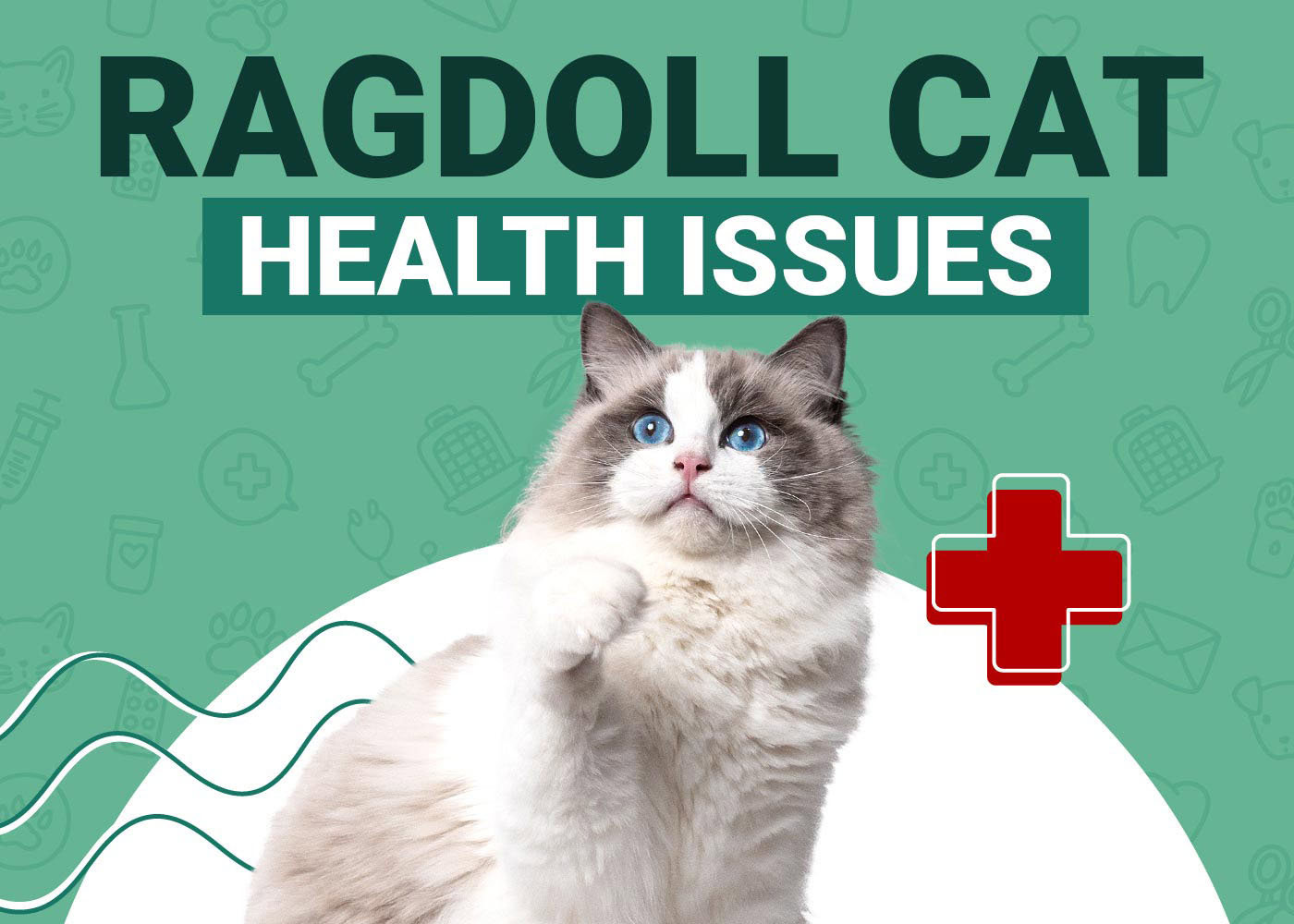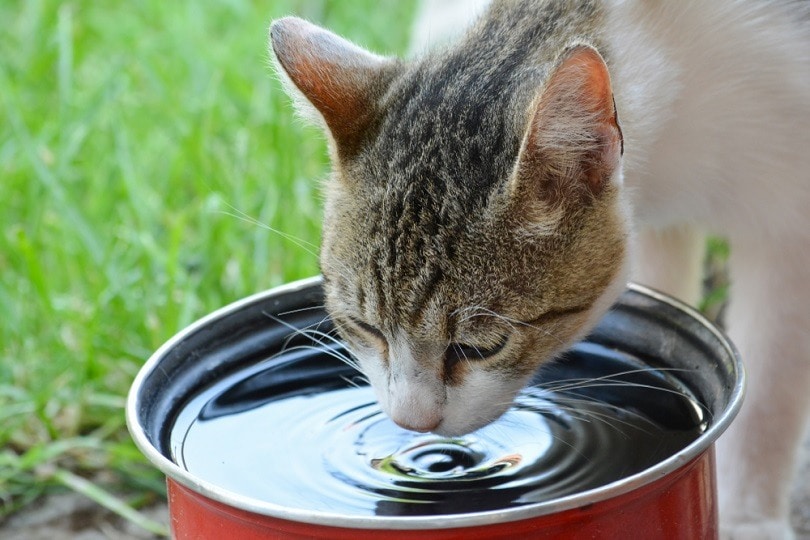VET APPROVED

The information is current and up-to-date in accordance with the latest veterinarian research.
Learn more »One of the most unfortunate experiences for a cat owner and their pet is discovering that worms have taken up residence in the cat’s intestine. Finding worms is an alarming and unpleasant experience, and they can also raise health concerns. However, most types of worms can be treated and removed with the correct diagnoses and management.
If you have any concerns about your cat having worms, you should contact your veterinary clinic for advice and effective treatments.
If the worms aren’t visible, you may be confused as to whether your cat has worms. So, we compiled a list of signs that may indicate that your cat has unwelcome guests, along with the answers to frequently asked questions about these parasites.

The 8 Signs of Worms in Cats
1. Visible Worms
The most obvious sign that your cat has worms is when you can visibly see them. You may notice full or half worms or eggs in their stool. Sometimes, worms or eggs move to a cat’s anus and get caught in the fur. Roundworms resemble spaghetti and are commonly detected in poop or vomit.
Tapeworms are segmented, long, and flat, and your cat’s poop may contain whole tapeworms, or they may protrude from the rectum. The segments can often separate and these look like bits of rice.
2. Weight Loss
Your cat may start to lose weight if they have worms, even if your cat’s appetite remains the same or even increases. Worms can cause weight loss because your cat will not receive as much energy from their meals, no matter how much they eat.

3. Increased Appetite
Worms may cause an increase in appetite when they are present. This is one of the common indications of worm infestation. Your cat needs to eat more food to maintain their physical condition as the worms rob them of essential nutrients. However, even after eating more, your cat may still lose weight, so the combination of weight loss and an increase in appetite may indicate that your cat has worms.
4. Vomiting and Diarrhea
Worms can cause gastrointestinal irritation, which may lead to vomiting and diarrhea. These are common signs of worms. Cats sometimes vomit to remove hairballs, but if it’s happening more frequently than usual, worms can be to blame. With parasite-caused gastritis, a cat experiences chronic vomiting, which causes them to feel sick often. Certain worms can cling to the intestine’s wall, which is where they get their nourishment, and cause damage and inflammation, which commonly causes diarrhea.
If your cat is vomiting or experiencing diarrhea, speaking with a veterinarian is a good idea.
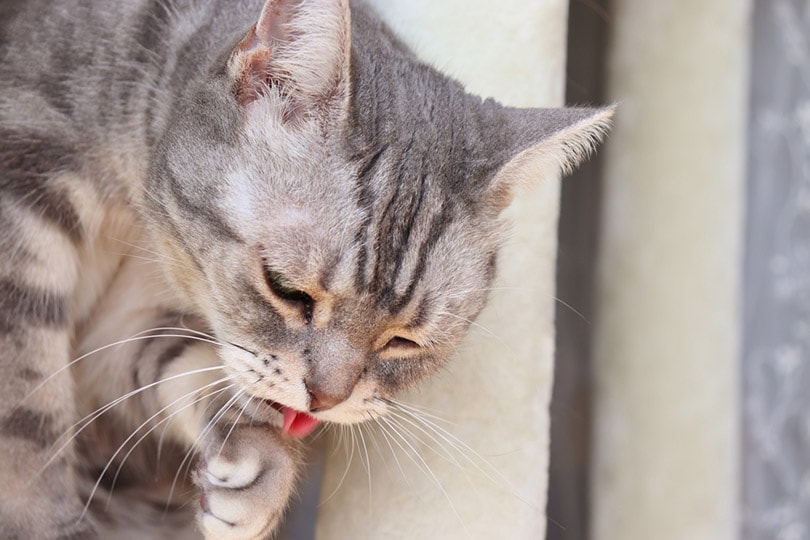
5. Dry and Coarse Fur
Due to malnutrition or dehydration from the worms, your cat’s fur may look dull, coarse, or clumped, and they’ll also have dry skin. If a cat has worms, it will affect their overall health as the worms deplete their body of vital nutrients. Their coat can be a clear indicator that they are not well or receiving enough of the proper nutrients.
6. Anemia
A healthy cat should have pink gums. However, if they appear pale or white, your cat may be suffering from anemia brought on by the worms. Anemia can occur when a cat has a severe worm infestation because the worms latch onto the wall of the intestine, causing blood loss.
Internal bleeding and bloody diarrhea are caused by some worms, such as hookworms, which attach to the intestinal wall and feed on blood.
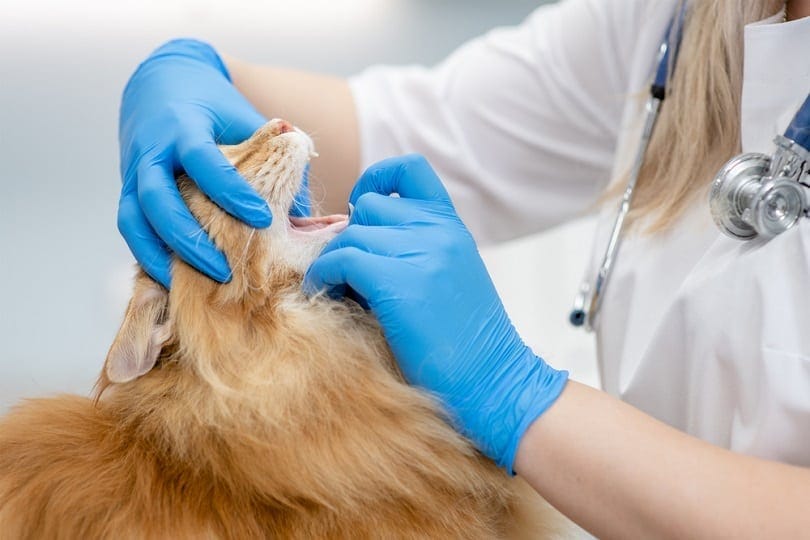
7. Lethargy
Worms are parasites that deprive your cat of vital nutrients and energy. If the infestation persists long enough, your cat can suffer from malnutrition or anemia. This can lead to lethargy, and your cat can feel exhausted and weaken more quickly than a healthy cat if they don’t get the nutrition that they need.
8. Coughing
Cats can contract heartworms, tapeworms, or lungworms, which can lead to coughing or shortness of breath. Coughing due to a worm infestation occurs when the worms colonize the lungs and the surrounding area after entering the bloodstream. Worm-induced coughing can be noticed with other signs, such as vomiting, weight loss, and lethargy.
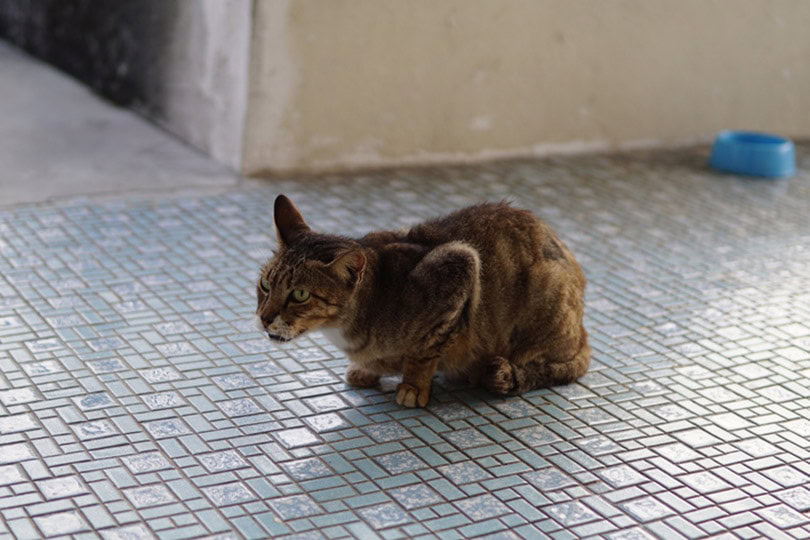

Frequently Asked Questions
How Do Felines Get Worms?
Cats can get infested with worms by touching infected feces or parasite eggs. This can happen when a cat ingests an infested host, such as rats and birds, walks through an area with eggs or infected feces, or ingests them when grooming and sharing a litter box that contains infected stools. Since some roundworms and hookworms are not species-specific, cats can pick up infected eggs from dog poop. They can also get tapeworms from fleas.
What Type of Worms Can Cats Get?
The worms that most often affect cats are tapeworms, hookworms, roundworms, and whipworms. Even the variety of less common cat worms can be lethal or cause significant health issues, such as heartworms, lungworms, liver flukes, and stomach worms.

How Do You Get Rid of Worms in Cats?
When worms have been diagnosed in your cat, your veterinarian will administer a dewormer to kill the worms in the intestine. Roundworm, hookworm, tapeworm, and whipworm infestations can be treated with broad-spectrum prescription treatments, but they should be administered with caution and according to your veterinarian’s instructions. Your cat may need additional doses to kill the larvae that could have emerged after the initial dose.
Your vet may also advise a monthly flea prevention treatment because tapeworm infestations can reoccur if your home has fleas.
Over-the-counter treatments are also available and easily accessible. However, it is not advised to try treating your cat for worms with over-the-counter medications or natural therapies without knowing their safety and efficacy. There is no guarantee that these treatments will be effective, and some homemade concoctions could be harmful to your cat. While they may seem easier and more cost-effective, it is always best to consult your veterinary clinic for the best and safest worm treatment.
How Can You Prevent Worms in Cats?
You can help prevent worms by practicing good hygiene and using worm and flea-prevention medication. In the case of heartworm in particular, prevention is important because there are no safe treatments for felines. Cats that hunt frequently or live with immunocompromised people should be wormed on a regular schedule, around every 3 months at a minimum.
Frequent litter box cleaning and replacement are critical for indoor cats in order to reduce their exposure to contaminated feces. If your cat stays outside, you should remove debris from the yard and use deterrents to keep neighborhood pets and wildlife away.
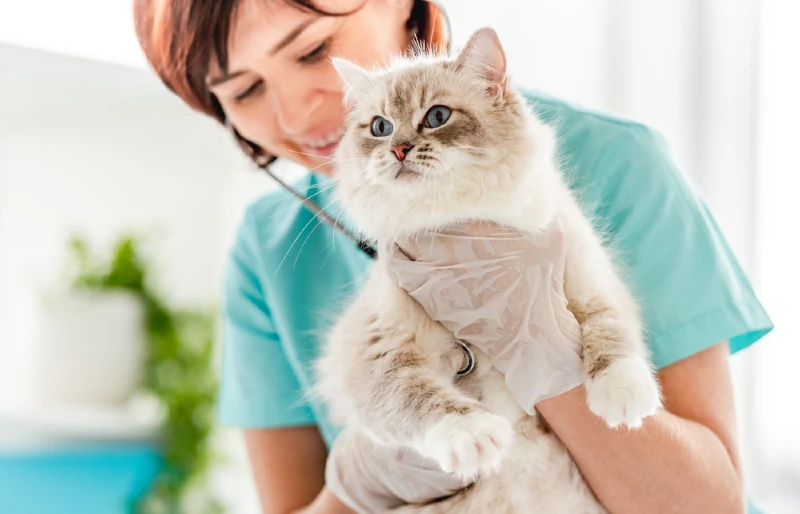
What Will Happen If I Don’t Treat My Cat for Worms?
Depending on the type and severity of the infestation, untreated worm infestations can cause mild to severe health issues in your cat. As larvae travel through the body’s organs and tissues to make their way to the intestine, they may cause severe skin infections, pneumonia, blindness, and convulsions.
Persistent loss of blood and essential nutrients that the intestines are supposed to absorb can lead to ongoing anemia, dehydration, and weight loss. In some cases—for example, heartworm—it can be fatal.

Conclusion
It is common for cats to pick up worms, and preventing and treating these parasites is part of owning a cat. Many times, there will be no obvious signs of worms, and this is why your veterinarian recommends regular fecal exams. Potential signs of a worm infestation include worms or pieces of worms in stools, weight loss, increased appetite, lethargy, vomiting, diarrhea, and an overall decline in your cat’s health. If a worm infestation is left untreated, it can harm or even kill your pet, so it’s essential to recognize the signs and see your vet as soon as you suspect that your cat has worms.
Featured Image Credit: stokerolga, Shutterstock
Contents
- The 8 Signs of Worms in Cats
- 1. Visible Worms
- 2. Weight Loss
- 3. Increased Appetite
- 4. Vomiting and Diarrhea
- 5. Dry and Coarse Fur
- 6. Anemia
- 7. Lethargy
- 8. Coughing
- Frequently Asked Questions
- How Do Felines Get Worms?
- What Type of Worms Can Cats Get?
- How Do You Get Rid of Worms in Cats?
- How Can You Prevent Worms in Cats?
- What Will Happen If I Don’t Treat My Cat for Worms?
- Conclusion







